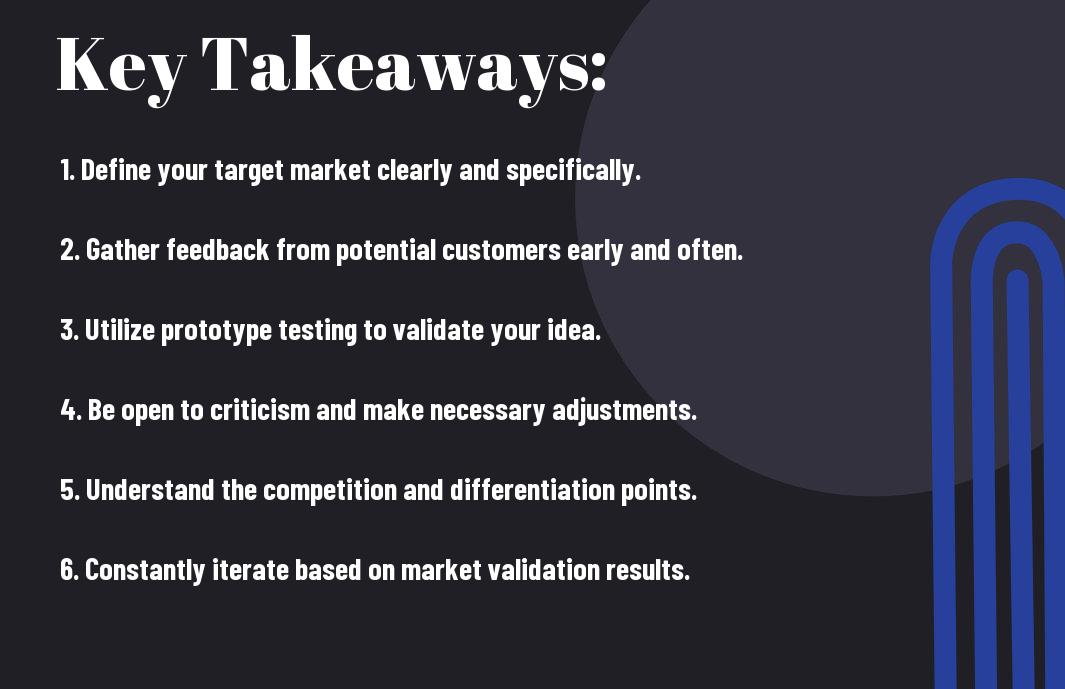Validation of your startup idea is crucial to its success, yet many entrepreneurs face challenges in ensuring that their concept resonates with the market. In today’s competitive business landscape, the lack of market validation can be detrimental, leading to wasted time, resources, and ultimately, the failure of the startup. By addressing these market validation challenges effectively, you can increase the chances of your startup idea resonating with your target audience, gaining traction, and ultimately achieving success. In this blog post, we will explore the key market validation challenges that startups often encounter and provide insights on how to overcome them to ensure that your startup idea resonates in the market.

Developing a Market Validation Strategy
Some of the biggest challenges faced by startups revolve around market validation. Without a sound strategy in place, even the most innovative ideas can fall flat. To ensure your startup idea resonates with your target market, it is imperative to develop a comprehensive market validation strategy. A great resource to guide you through this process is How to Validate Your Startup Idea in 4 Steps.
Identifying Your Target Audience
Identifying your target audience is crucial for the success of your startup. Understanding who your potential customers are, their needs, preferences, and pain points will help you tailor your product or service to meet their specific demands. Conduct market research, surveys, and interviews to gather valuable insights that will guide your market validation process.
Leveraging Data-Driven Insights
The key to successful market validation lies in leveraging data-driven insights. By analyzing market trends, consumer behavior, and competitor strategies, you can make informed decisions about your startup’s viability. Utilize tools such as Google Analytics, social media analytics, and customer feedback to gather relevant data that will shape your market validation strategy.
Validation: Market validation is a critical step in the startup journey. By validating your idea with real data and insights, you can mitigate risks, identify opportunities, and ensure that your product or service resonates with your target audience. It is important to pay attention to the feedback received during the validation process, as it can highlight potential pitfalls and areas for improvement. Embrace data-driven decision-making to increase the chances of success for your startup.
Qualitative and Quantitative Approaches
Utilizing Surveys and Interviews
Interviews are a valuable tool for startups looking to validate their ideas. They provide direct insights from potential customers, allowing entrepreneurs to understand their needs, preferences, and pain points. By conducting interviews with a diverse range of individuals, startups can gather qualitative data that offers deep insights into customer behavior and motivations. This information is crucial for refining business ideas and ensuring that the proposed solution addresses a genuine market need.
Analyzing Market Trends and Metrics
Surveys play a vital role in identifying market trends and metrics that can help validate startup ideas. By collecting quantitative data through surveys, entrepreneurs can analyze factors such as market size, growth potential, and competition. This data-driven approach enables startups to make informed decisions based on statistically significant information, helping them assess the viability and scalability of their business concepts. By leveraging surveys to gauge customer interest and feedback, startups can adjust their strategies to align with market demands and stay ahead of the competition.
Implementing Feedback and Iteration
Embracing Early Customer Feedback
Once again, one of the key steps in ensuring your startup idea resonates with the market is embracing early customer feedback. With this feedback, you can gain valuable insights into what customers truly want and need, allowing you to iterate on your product or service to better meet those demands.
Continuous Product and Service Improvement
Early on, it is crucial to focus on continuous product and service improvement to stay ahead in the competitive market. Early identification of areas that need enhancement and prompt action on those feedback will help in building a product that truly resonates with the target audience.
Product iteration is an ongoing process that involves collecting feedback from customers, analyzing data, and making necessary adjustments to improve the overall user experience. By prioritizing continuous improvement, you can ensure that your product remains relevant and competitive in the ever-evolving market landscape.

Navigating Financial and Resource Constraints
Budget-Friendly Market Validation Techniques
For startups facing financial limitations, there are still effective ways to validate their market without breaking the bank. An example is leveraging social media platforms for targeted surveys and feedback. Conducting online polls, creating engaging content to spark discussions, and utilizing free analytics tools can provide valuable insights into customer preferences and behavior.
Balancing Speed and Thoroughness in Testing
Any startup aiming to validate its market must strike a balance between speed and thoroughness in testing their ideas. To achieve this balance, entrepreneurs can prioritize key aspects of their product or service for quick validation while still ensuring comprehensive testing of critical theories and assumptions. This approach allows startups to iterate rapidly while maintaining a robust validation process.
Scaling and Adapting Your Approach
When and How to Scale Your Validation Efforts
Efforts Unlike the initial stages of market validation, scaling your validation efforts requires a more strategic approach. It is crucial to identify key indicators that suggest your startup idea is gaining traction and ready for a larger audience. This may involve expanding your target market, increasing the scope of your surveys or interviews, or even investing in more advanced analytics tools.
Adjusting to Market Shifts and Evolving Customer Needs
Efforts As markets are dynamic and customer preferences constantly evolve, it is imperative for startup founders to be vigilant and adaptable. Scaling your validation efforts means staying ahead of market shifts and proactively responding to changing customer needs. This requires a willingness to pivot your approach, modify your product or service offerings, and even explore new market segments.
Adapting to market shifts can be challenging, but also presents opportunities for innovation and growth. By closely monitoring market trends and listening to customer feedback, startups can position themselves for long-term success in a competitive landscape.
Summing up
Considering all points discussed, addressing market validation challenges is crucial for ensuring your startup idea resonates with your target audience. By conducting thorough market research, gathering feedback from potential customers, testing prototypes, and iterating based on learnings, startups can increase their chances of success. It is vital to continuously validate and adapt your idea to meet the evolving needs and preferences of customers to stand out in a competitive market. By taking a strategic and customer-centric approach to market validation, startups can position themselves for growth and long-term sustainability.
FAQ
Q: What are common challenges in addressing market validation for a startup idea?
A: Common challenges in addressing market validation for a startup idea include identifying the target market, understanding customer needs, competition analysis, and gaining traction with early adopters.
Q: How can a startup ensure that its idea resonates with the market?
A: A startup can ensure that its idea resonates with the market by conducting thorough market research, obtaining feedback from potential customers, iterating based on feedback, and validating assumptions through testing and experimentation.
Q: Why is market validation important for the success of a startup?
A: Market validation is important for the success of a startup because it helps in reducing the risk of failure, identifying product-market fit, attracting investors, and ensuring that resources are allocated efficiently towards developing a solution that truly meets customer needs.
